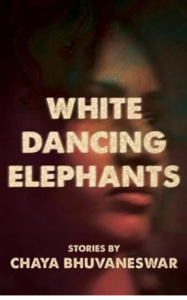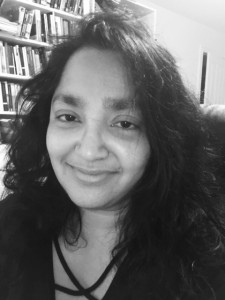In the FPP Interview with author Chaya Bhuvaneswar, whose book WHITE DANCING ELEPHANTS was a finalist for the PEN/Robert W. Bingham Prize for Debut Short Story Collection, we hear how going to Hunter College High School dissuaded her from allowing others to arrange her marriage, how her stories stopped boring her once she stopped “whit[ing] out” her race, her guidance for emerging writers, and much more. Come to Silvana on Sunday, April 28th to hear Bhuvaneswar read with Jericho Brown, Veronica Liu, Holly Masturzo, Willie Perdomo, and Alexandra Watson. Admission is free. See you at 6pm!
In your short story collection WHITE DANCING ELEPHANTS, you center the dreams and crises of women, and do so without apology. How did you first know you wanted to tell these kinds of stories? It’s interesting that a common thread among women writers of color I know or have read about is that we all started with some type of engagement with “white stories.” One of the earliest characters I ever wrote about was a white fantasized man who played classical guitar and lived in a house on a cliff with me. His name was Christopher. I wrote out many permutations of the life we made together and stopped when I realized how much it bored me to tell stories that “whited out” my own. I.e. in this Christopher story, what made it boring was that I, the telling narrator, had no race or identity or past. And writing in English, this allowed the reader to assume I was white, too.
I was very young, like age eleven or twelve, when I started writing “those Christopher stories”. But it actually took many years before I understood how frequently I “whited out” descriptions of my experience, my family’s, my community’s — and how exciting and alive the writing could be once I stopped doing that. So writing that centers the experiences and perceptions of women of color — for me it’s the equivalent of “going where the money is” — going toward what’s most alive and identifiable as “me” and necessary for me to have written and not anyone else. That said, it is now so different to write stories with only white protagonists, like the story “In Allegheny” in the collection, in which Indian-Americans feature so peripherally. There’s engagement of white characters with various Others; there’s a sense of common humanity as earned from a process of engagement.
 Is there something you wish you could tell your readers that they don’t learn from the book? Don’t ever fully give up on any story or idea. Move from one thing to another if you need to but keep a shard that you might come back to and expand differently.
Is there something you wish you could tell your readers that they don’t learn from the book? Don’t ever fully give up on any story or idea. Move from one thing to another if you need to but keep a shard that you might come back to and expand differently.
You are a practicing physician. Tell us about storytelling in medicine, in your medicine.The meanings of various experiences — so central to medicine and the practice of medicine as a fundamentally human and connecting activity rather than a series of steps that could just as well be carried out by a machine. Meaning is bound up with story, in medicine, and a patient’s story can only be understood by spending time, and this is the challenge every day. To be efficient so the whole system of care can do what it has to, while at the same time communicating on an individual level that we have all the time we need, that we have space for the story to be opened, to be revealed, to be shared. I think that is one of the most beautiful aspects of medicine – the way that with time you learn to use your time in a completely different way than at the beginning. Not necessarily linear or predictable. Connection can happen when it’s not clear how it would.
It’s 2019. What gives you hope? What gives you pause? A politics of hate isn’t comforting for the long term. I have to believe that and seeing people organize, march, vote (including voting the most diverse Congress into power, in history) makes me believe it in my heart. No one can find it sustaining to just hate. At the end everyone wants to be able to have good healthcare, a reasonably doable job that allows for stable housing and childcare. Everyone wants their work and livelihood to sustain the ability to love and demonstrate love to people closest to them. Even if they construct that world so that everyone close to them is the same color or religion. The politics of hate at the cold, shriveled heart of the current administration hasn’t given people comfort or sustainability. We’re hard-wired as a species to eventually figure that out and rise up against anything that harms us this much.
What American crises keeps you up at night? Healthcare – access to medicines. There are really concerning shortages, as well as problems getting life sustaining meds like insulin. Puerto Rico’s recovery being so slowed by inaction by the President. The fact that there still isn’t clean water in Flint. Police violence and brutality, some of the victims of which are police officers of color. There’s preventable strife and a sense of the gloating cruelty just moving too fast to be stopped all at once. But we have to keep taking deep breaths and approach each crisis really methodically and confidently. We know it doesn’t have to be like this and we are going to solve it. We have to keep that mindset.
Is there a piece of writing– yours or someone else’s–that really speaks to your experiences these days? Jericho’s poems. Nicole Sealey’s poems. Your journalism.
What should the future be? Hopeful, decent, unafraid.
When do you feel most “we”? When do you feel most “I”? I think at some of the readings; always when I’m with family; and I feel the most I probably when I sit down to write. Flaws and all!
Do you have any trouble with the “we”? Not so far, but that may because I gave myself a lot of freedom when I escaped having an arranged marriage and everything since has felt free.
Tell us about your Harlem. I went to high school in Harlem. I took the subway to 96th and Lexington each day and enjoyed walking on morning streets full of people who were all shades of brown.
What was your first knowledge of Harlem? Getting into Hunter, taking the train to go to school, walking around, realizing there was a big world and I was going to get to be out in it once I determined I would not have an arranged marriage as I’d been expected to do.
Who are writers that we should be reading right now? Tyrese Coleman’s HOW TO SIT, which was short listed for the PEN Open Book award; Vanessa Angelica Villareal, whose debut poetry collection was really beautiful, and for which she just received a Whiting Award. Alexander Chee, all his interviews about writing and his essays. Walter Mosley. Sandra Cisneros. Bharati Mukherjee.
What advice would you give emerging writers today? Don’t try to predict when you will “break through” but just make a comprehensive list of everything you think you can do toward that goal and then just do it without worrying about whether any of it will work. I.e. if you think submitting 300 pieces of writing per year via Submittable will help you publish at least 30, do it. Commit.
Is there something I didn’t ask you that you’d like to share? So thrilled to be part of the First Person Plural Reading Series and feel so grateful too that within literary community, I have found my tribe.

